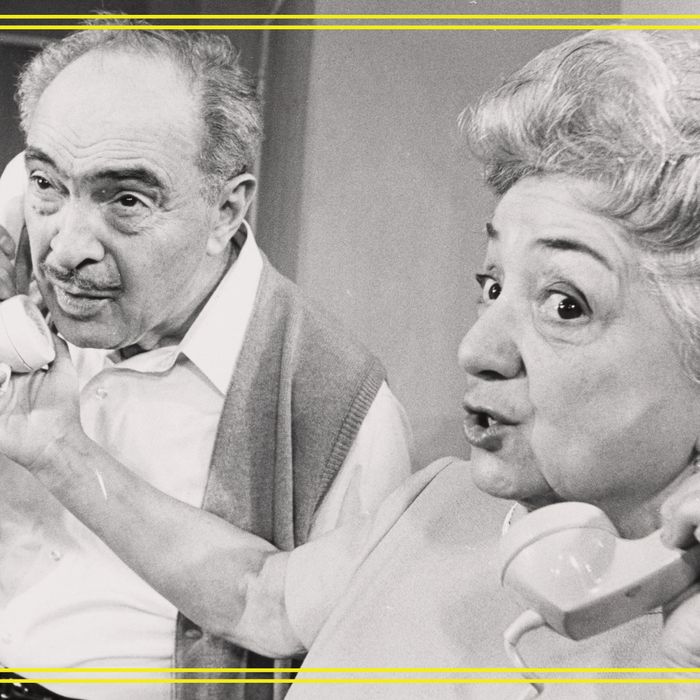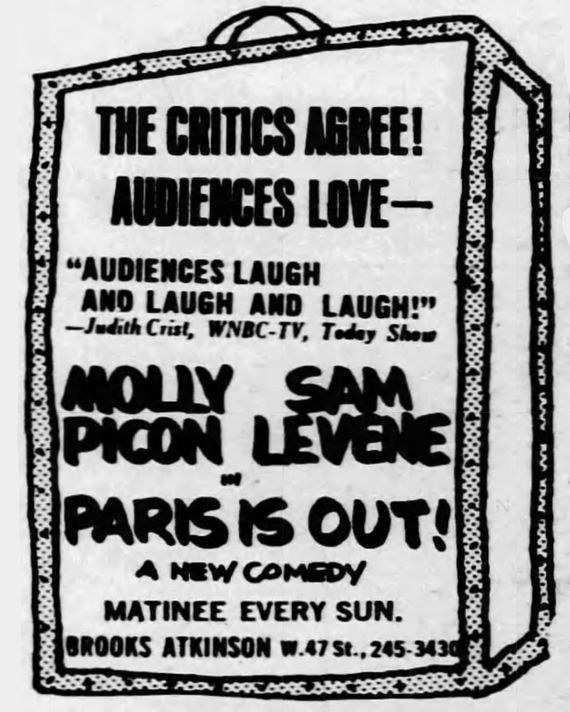
Paris Is Out!, a slight Broadway comedy starring Molly Picon and Sam Levene, opened at the Brooks Atkinson Theatre on February 4, 1970. But opened is not quite the right term: The play’s producer, David Black, had hit on a novel idea, one that gave the playwright, Richard Seff, some misgivings: There would be no traditional opening night. Instead, the play would run for two weeks of previews, starting on January 16, after which critics, should they choose, could attend the show gratis. “This is an audience play,” Black told Seff at the time. “I don’t trust the critics. I don’t want them to see it till the audience tells them they love it.” As Seff, now 92, told me, it was “a concept which I should never have permitted. But I did, I did.” This was the kind of concession a reluctant playwright made for a chance to debut on Broadway.
It was the first play credited to Richard Seff, but Paris Is Out! wasn’t Seff’s first play. That was The Whole Ninth Floor, produced under the pseudonym “David Phillips,” and it closed out of town. The experience had given Seff, then working as a talent agent for MCA, the confidence to try again, this time without the fake name. He took inspiration from Neil Simon — “My great idol, even though he was younger than I” — and in particular Simon’s 1961 Broadway debut, Come Blow Your Horn, a family comedy that echoed long-ago hits like You Can’t Take It With You and My Sister Eileen. Simon’s play “had the kind of reviews I later had — promising, three or four of them excellent, some very mixed,” said Seff. “It was not a genuine smash, and there were no big names, but people liked it. It made just enough money to pay the bills and have a small profit, and though it wasn’t a major play, it encouraged him to write another one immediately. But he wasn’t working for Lew Wasserman as an agent!”
For his first time out under his own name, Seff like Simon mined his family for source material. “I wrote a play about my mother and father, who had been amusingly and contentedly bickering for 35, 40 years, and they were still wondering if this will work.”
The play’s conflict, typical of a domestic comedy of that era, is on the gentle side. Hortense and Daniel (stand-ins for Seff’s own parents) bicker about vacation plans. Hortense dreams of Europe. Daniel won’t go to Venice (the canals might overflow), and Paris is, as the title says, definitely out. Their son and daughter have problems of their own. Charlotte is recently widowed with a teenage son. Their son, Roger, is ending marriage No. 2, adamant that he won’t be charmed into wedlock a third time. His parents, however, have someone in mind: a travel agent, Arlene, who fears a life without marriage. High jinks and hilarity are supposed to ensue. (One example: When Arlene says, “I mean Roger, Moby-Dick was not even a person. He was a whale.”) But Seff’s play, originally called Will It Last?, was good enough to attract the interest of David Black, who had produced the Broadway hit George M! a year earlier, in 1968.
Seff is Jewish, but, he said, “my play was not about being Jewish, but about being a family.” He envisioned someone like Mildred Natwick — a long-established Broadway star who’d played the mother in Neil Simon’s Barefoot in the Park — as the matriarch. Natwick wasn’t available, but Molly Picon was, and she was a clear theatrical name. Casting the Yiddish-theater star, who once had a namesake playhouse on Second Avenue and by the 1960s was well known from English-language TV and movies, “gave the play a slightly more urban, more Semitic feeling than I had intended,” Seff said. Picon, though, would also draw crowds, beginning at Playhouse at the Mall in Paramus, New Jersey, where Will It Last? had a two-week stint, from October 14 to 26 in 1969. (It took the place of the just-closed production of Three Men on a Horse, starring Sam Levene (the original Nathan Detroit in Guys and Dolls.) The Paramus theater was run at the time by Robert Ludlum, years before The Bourne Identity made him famous.
Black believed Will It Last? had the makings of a Broadway success that could lead to greater things for Seff. After all, Come Blow Your Horn had led to the far more successful Barefoot in the Park. Changes, however, were necessary before the transfer at the beginning of 1970. It needed a new title because it was a hanging curveball, one that would allow critics to knock out a headline like the Paterson Evening News’ “Will It Last? It’s Anyone’s Guess.” (Most of the early reviews were mixed, with another local newspaper judging: “It’s not a bad play, but in its present form it’s just not a very good one, either.”) The new name was Paris Is Out!
Then there was the matter of the cast. Jack Somack, who played Daniel in Paramus, wasn’t star enough to match Picon’s wattage, and Sam Levene was suddenly available for the role when Three Men on a Horse didn’t transfer. Black also decided that Roger and Arlene needed to be recast. Terry Kiser — later known as the corpse in Weekend at Bernie’s — and Zina Jasper had the theatrical chops that Black and his director, Paul Aaron, wanted. (The three original actors, including Somack, weren’t dismissed entirely, continuing to work as understudies for the Broadway production.)
Black also needed cash to mount Paris Is Out! to the tune of $140,000. Which is how a 23-year-old, just out of Wharton Business School and looking to do something besides working in his father’s business, ended up walking into Black’s office above the Palace Theater in the fall of 1969.
Donald J. Trump hadn’t been announced. He showed up in a single-minded pursuit, hoping to take Black to lunch. They went to the Metropolitan Club. Trump had heard about Paris Is Out! and, apparently, got hold of a copy of the script. As Black recalled to the New York Times in 2016, Trump “peppered him with questions about the ins and outs of the theater business,” asking how Black had discovered Seff’s play and how long it would need to run on Broadway before it broke even.
“He had done his homework, and that was unusual,” Black said. “Most of the people who put up money for shows just wanted to meet girls and go to parties, but he wasn’t like that.” By the end of the lunch, Trump made his offer, one that sounds characteristic of him: He’d pay half the cost of putting up Paris Is Out! so long as he got equal billing on the posters and in Playbill. Black remembered Trump’s investment as 70 grand; Seff thinks it was lower, closer to $50,000.
Somewhat less characteristically, Trump kept well away from the creative side of the production. He didn’t interact with the cast or crew; Seff remembered Trump driving up to the Brooks Atkinson Theatre in his convertible on two occasions, then standing in the back of the house with Seff to watch rehearsals. Seff and Trump exchanged hellos and not much else. Operations were a different matter: “He wanted to know why we had to pay two men to pull the curtain up and down when they played pinochle the rest of the day,” Black told the Times. (Union rules, of course.) “And at one point he came in and said, ‘Our poster is behind one of the other posters.’” (Black, through his assistant, declined a request to comment for this story.)
Trump, however, had little say in Black’s decision to forgo a proper opening night. Dictating to critics when they might be permitted to see a Broadway play portended disaster. Black’s decision helped to seal the play’s fate. The non-opening at the Brooks Atkinson was on February 4, 1970. The Associated Press’ theater man, William Glover, bought a ticket — $8.50, or just over $56 in 2020 dollars — to an early preview of Paris Is Out! His verdict was not good: “a lopsided little ethnic caper” and “Surprise and drama are conspicuously absent, lord knows, and the wit never rises beyond the peak of paternal Levene advice that ‘girls should get married, and boys, no.’ So? Well, he has those eyebrows and that shrug.”
Glover’s criticism paled next to the judgment of the New York Times’ Clive Barnes. He called the play “as harmless as it is pointless,” its scenarios “pitiable,” the acting forgettable. Half a century later, Seff could still quote it to me, and huffed that “[Barnes] was a plump English gentleman who had been a critic for about 15 minutes … he came from British ballet, with no idea what an American family looked like.” (Barnes, later the longtime dance and drama critic at the New York Post, had by then been the Times’ theater critic for three years; his physique at the time was slim.)
There were a few good reviews. Marilyn Stasio, then with Cue magazine, wrote: “The delightful pair, Picon & Levene, have enough comic know-how to keep a matinee audience in happy convulsions.” The Wall Street Journal compared the play, approvingly, to the long-ago sitcom The Goldbergs. But most ranged from tepid to savage. Hobe Morrison, critic for the White Plains Journal-News, cracked, “To paraphrase George S. Kaufman, Paris Is Out! is the sort of play whose situations and dialogue you whistle as you enter the theater.” The Central Jersey Home News was cruel in its kindness: “There are all sorts of reasons to go to the theater. Some people go to escape. Paris Is Out! … is for people who go to the theater to meet themselves.”
The show was not a closed-in-one-night disaster. Seff preferred to characterize the play, generously, as a “nervous hit.” But within days, the newspapers ran announcements of Molly Picon’s forthcoming appearance in another play slated for a tryout in Paramus in mid-May. What finished off Paris Is Out! after 112 performances, in the playwright’s telling, was a blizzard on Easter Sunday 1970 that tamped down theatergoing for a week. The producers, including Trump, lost their whole investment. The surprise storm also ended the Broadway run of two other plays, including one by the syndicated columnist Art Buchwald.
Seff’s play didn’t disappear for good. Molly Picon appeared in a production mounted in Philadelphia the following summer, and Pat O’Brien and his wife, Eloise, toured with it in 15 cities over the next year and a half. Seff attended a dinner-theater production in Pennsylvania just two years ago. “When I saw the set, I thought it was better than the one we had on Broadway.”
As for Trump, he learned that the play would close from Black at a coffee shop off Eighth Avenue. “When I told him I had to close it, he said, ‘David, what should I do now?’” Black recalled in 2016. “I said, ‘Why don’t you try real estate?’” Seff, meanwhile, muses that the butterfly effect emanating from the failure of Paris Is Out! may have changed the world. “If my play had been a big hit, I guess he wouldn’t be president.”


